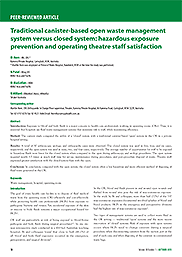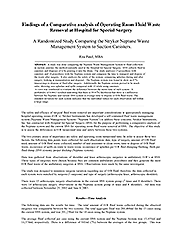Waste management practices
The operating room is a fluid-rich environment. Blood and other bodily fluids are highly regulated biohazards that can place staff at risk of contamination. This section provides information on methods for fluid waste management and an overview of the regulatory issues surrounding the disposal of these fluids.
O.R. Safety Webinar Series: Protecting Caregivers
Topic 1: Safe Patient Handling in the O.R.
- Define Safe Patient Handling
- Review the biomechanics of lifting
- Describe the impact of lifting on caregivers and patients
- Recognize high risk patient care activities
- Identify components of SPH program
Topic 2: Fluid Waste Management
- Describe the different types of medical errors in the O.R.
- Define the types of medical waste and how the O.R. is specifically impacted
- List the current practices and potential hazards associated with liquid waste
- Describe the risks associated with fluid waste management in the O.R.
- List the benefits of an effective and safe fluid waste management program in the O.R.
OR Safety Series: Fluid Waste Management
Healthcare facilities create a tremendous amount of waste that includes solid, fluid and often biohazardouse medical waste. This waste also has a higher potential to cause infection and injury than the waste in any other industry. This program discusses current practices in fluid waste management, recommended guidelines for safe disposal of fluid medical waste and offers safe and reliable methods for healthcare waste handling to protect healthcare workers and patients.
Learning objectives
- Describe the different types of medical errors in the O.R.
- Define the types of medical waste and how the O.R. is specifically impacted
- List the current practices and potential hazards associated with liquid waste
- Describe the risks associated with fluid waste management in the O.R.
- List the benefits of an effective and safe fluid waste management program in the O.R.
Traditional canister-based open waste management system versus closed system: hazardous exposure prevention and operating theatre staff satisfaction
Authors: M Horn, RN, CNS, N Patel, MBA, M MacLellan, MBA, N Millard, BBioMed (Hons), MMedSci
Exposure to blood and body fluids is a major concern to health care professionals working in operating rooms (ORs). Thus, it is essential that hospitals use fluid waste management systems that minimise risk to staff, while maximising efficiency.
Findings of a comparative analysis of operating room fluid waste removal at hospital for special surgery
Author: Rita Patel, MBA
A study was done comparing the Neptune Waste Management System to fluid collection in suction canister, the method currently used at the Hopsital for Special Surgery.
28996




